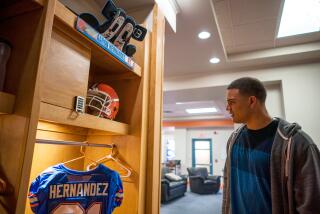Q&A;: Director Peter Berg and his ‘Heads Up Football’
Director Peter Berg was in the midst of researching the film version of “Friday Night Lights” in 2003 when a high school player from San Antonio, Texas, tried tackling an opponent by sticking his helmet into the foe’s chest.
The teen defender, David Edwards, shattered two neck vertebrae and was left paralyzed from the shoulders down.
Berg never forgot, and it’s why the Southland resident embraced being commissioned by the NFL to help implement a project, “Heads Up Football,” to improve safety in the game as season kickoffs commence across the nation.
Berg, 50, who also produced HBO’s “On: Freddie Roach” last year, has an affinity for sports and last week looked in on world super-welterweight boxing champion Saul “Canelo” Alvarez at the Santa Monica gym Berg co-owns with comedian Garry Shandling.
You opted to take on the NFL project to accomplish what?
“It’s a comprehensive youth safety program by the NFL-sanctioned youth football governing body, USA Football. If you start with the history of safety in football, head and neck injuries have long been front and center, and that’s especially true now. Everyone understands the game is faster than it’s ever been, that the teaching can be, ‘Get out there and kill that guy,’ and that parents are reasonably saying they don’t want their kids to play tackle football. Our theory, under the leadership of Commissioner Roger Goodell, is that prevention is the best medicine. Concussion treatment is not that great. So the best way to treat these issues is the entry program — teaching how to tackle without leading with the head, and not targeting the head. We’re teaching a new way of playing the game. The belief is that by teaching several different techniques to eliminate the helmet from the tackle, youth coaches will teach this heads-up tackle drill for at least 20 minutes each practice, the muscle memory will kick in with the players instinctively not using their head in running, passing, blocking and tackling and they’ll take it from Pop Warner to high school to college to the NFL. The spirit is to make the game less vicious and still competitive. … It’s not lip service, not a joke, not a negotiation.”
You’ve filmed some public-service type pieces, are planning to film a round-table discussion in New York soon with legendary tacklers Lawrence Taylor, Dick Butkus and Deacon Jones to assess how to make the game safer, and what else?
“We created a pilot program with three USA Football clubs, including the 150 kids with the Santa Monica Vikings, to see what works, how best to teach this with parents involved and we’ll next year roll it out to 3,000 clubs across the country, 10,000 the year after that, making a film documenting how to make football safer. … When David Edwards became an instant quadriplegic before my eyes, it brought my attention to how little was being done for these players who suffer catastrophic injuries. My 12-year-old son is playing, and he’s been trained what’s universally agreed upon in the sport — not to use your head. I love the game of football. There’s so many great life lessons because of it. I played it, and I’d hate to see it go away.”
Sports by its nature is dramatic. What in your eyes convinces you that a sports subject is worthy of a film?
“I’ve always been drawn to stories that explore the psychology of violence. I’ve done movies on soldiers, police officers. I understand the emotional drama, the sacrifice, the skill. I find it endlessly compelling. My friends ask me when I’ll make a nice movie — a love story in Paris. I start shooting “Lone Survivor” Sept. 28, the story of 18 Navy SEALs in Afghanistan, with Mark Wahlberg playing the lone survivor. I continue to be drawn and very inspired by these stories.”
What’s your next sports-related project?
“I’m producing a documentary on parenting in youth sports, “Trophy Kids.” It’s gut-wrenching how these parents absolutely lose themselves in their kid. We followed four kids, a girl golfer, two football players and a basketball player.”
I know you attempted to extend the “On:” series to new Washington State football Coach Mike Leach. He spent time with you in his downtime after parting ways with Texas Tech, correct?
“He got into a sad situation with nasty folks at Texas Tech and was 100% innocent. I invited him to come live at my house and was coaching my then-9-year-old son in flag football. I’d awake and Mike Leach would be at my kitchen table drawing up plays. His theory was the young mind on defense couldn’t handle crossing patterns, so we had this crazy, high-speed offense no one could figure out and we were winning our games 50- and 60-0. When he left the house, he’d call for updates about how we were doing. I’d imagine it’ll take him a year or two to get going up there, but I guarantee you he’ll be causing problems and there’ll be some upsets in the Pac-12 soon. He’s the ‘Pirate,’ he’s not there to lose.”
Why the involvement with your own boxing gym?
“We just wanted a little club. Freddie was nice enough to steer ‘Canelo’ here. If we could find another guy of that caliber and disposition with no attitude or darkness, we’d do it, but we don’t want it to be a hard-core professional gym. Boxing can be a perfect film project. If Floyd Mayweather wanted to do “On:,” or if ‘Canelo’ keeps winning, we’ll be talking to those guys.”
Twitter.com/latimespugmire
More to Read
Go beyond the scoreboard
Get the latest on L.A.'s teams in the daily Sports Report newsletter.
You may occasionally receive promotional content from the Los Angeles Times.











